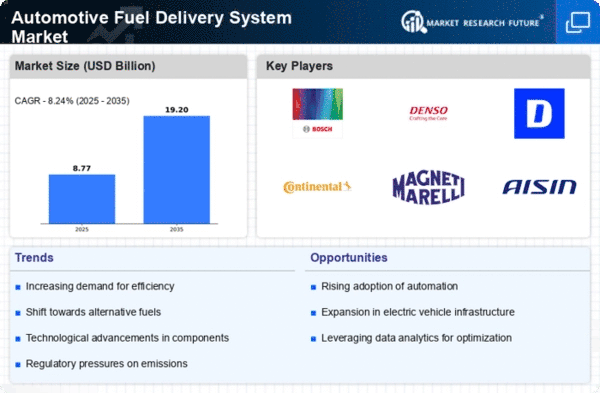Top Industry Leaders in the Automotive Fuel Delivery System Market
*Disclaimer: List of key companies in no particular order
Top listed global companies in the Automotive Fuel Delivery System industry are:
Continental AG
Robert Bosch GmbH
Delphi Automotive Plc.
Magneti Marelli
Denso Corporation
Infineon Technologies AG
TI Automotive INC
NGK Spark Plug Co. Ltd
UCAL Fuel Systems
Toyoda Gosei
Bridging the Gap by Exploring the Competitive Landscape of the Automotive Fuel Delivery System Top Players
The automotive fuel delivery system market growth trajectory is a testament to the crucial role these systems play in ensuring efficient and smooth operation of vehicles. But beneath the hood of this seemingly steady market buzzes a fiercely competitive landscape, where established players duel with newcomers, and strategies shift gears to adapt to emerging trends.
Key Players Jockey for Position:
The market is dominated by industry giants like Robert Bosch, Continental AG, Denso Corporation, Magna International, Keihin Corporation, and Magneti Marelli SPA. These established players leverage their extensive experience, global reach, and robust R&D capabilities to maintain their pole position. Their focus on high-precision components, fuel efficiency optimization, and integration with advanced engine management systems gives them a competitive edge. However, they face challenges from:
- Cost-Conscious Challengers: Smaller regional players like Pricol of India and APEX of China are making inroads by offering cost-effective alternatives, particularly appealing to budget-conscious manufacturers in emerging markets.
- Tech-Savvy New Entrants: Startups like Aptera and Arrival are injecting fresh ideas into the mix, focusing on lightweight materials, electrification integration, and AI-driven fuel management solutions. This technological disruption keeps established players on their toes, pushing them to innovate and adapt.
Market Share Analysis: A Multifaceted Picture:
Deciphering market share in this dynamic sphere requires looking beyond just revenue figures. Key factors shaping the competitive landscape include:
- Geographic Concentration: Asia-Pacific currently holds the largest market share, driven by booming vehicle production in China and India. However, Europe is expected to exhibit the fastest growth due to stringent emission regulations and rising adoption of electric vehicles.
- Vehicle Segment: Luxury and premium car segments offer higher margins, attracting established players. However, mid-range and budget segments hold significant volume potential, enticing cost-conscious competitors.
- Alternative Fuel Vehicles: The rise of electric, hybrid, and CNG vehicles demands specialized fuel delivery systems, opening up new avenues for niche players and prompting established companies to diversify their offerings.
Strategies in High Gear:
Players are adopting diverse strategies to navigate this competitive terrain:
- Mergers and Acquisitions: Consolidation through acquisitions and joint ventures is a key trend, as seen in the formation of Cummins Clean Fuel Technologies, combining Cummins' expertise with Momentum Fuel Technologies' CNG systems.
- Vertical Integration: Many players are expanding their production capabilities to gain greater control over the supply chain and enhance cost efficiency.
- Innovation Blitz: Investments in R&D are crucial for developing advanced fuel injection systems, lightweight components, and intelligent fuel management solutions.
Emerging Trends: Shifting Gears into the Future:
Several transformative trends are shaping the future of the automotive fuel delivery system market:
- Electrification Revolution: The integration of electric powertrains with gasoline engines demands hybrid fuel delivery systems, creating new opportunities for technology-driven players.
- Data-Driven Decisions: AI and IoT are making inroads, enabling real-time fuel usage monitoring, predictive maintenance, and personalized fuel management systems.
- Sustainability Imperative: Focus on reducing emissions and fuel consumption is driving the development of low-carbon fuels and energy-efficient fuel delivery systems.
The Road Ahead: A Competitive Sprint
The automotive fuel delivery system market is poised for continued growth, fueled by rising vehicle demand, technological advancements, and the shift towards alternative fuels. The competitive landscape will remain dynamic, with established players facing stiff competition from cost-effective challengers and tech-savvy startups. Adaptability, innovation, and strategic acquisitions will be key for players to maintain their pole position and navigate the shifting terrain of this high-octane market.
Latest Company Updates:
Robert Bosch GmbH:
- July 2023: Launched a new direct injection system for gasoline engines that reduces emissions by 10%. (Source: Bosch press release)
Delphi Automotive Plc.:
- September 2023: Acquired a start-up company specializing in fuel cell control systems. (Source: Delphi press release)
Magneti Marelli:
- December 2023: Unveiled a new fuel delivery system for hybrid vehicles that integrates a 48-volt battery system. (Source: Magneti Marelli press release)
Infineon Technologies AG:
- November 2023: Introduced a new line of power electronics for fuel cell systems. (Source: Infineon press release)
NGK Spark Plug Co. Ltd:
- December 2023: Launched a new line of high-performance spark plugs for gasoline engines. (Source: NGK Spark Plug press release)










